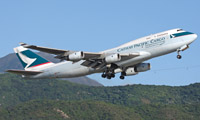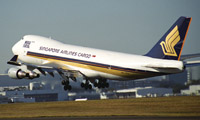Cargo Update
Freight fleets under pressure
September 1st 2012
Unless worldwide air freight demand resumes growth at near historic rates, the industry will face significant pressure to scale back new aircraft purchases or make substantial reductions in the fleets of existing freighters in the next five years. Read More »
 |
| Cathay Pacific Airways: adjustments to its cargo fleet |
That is the gloomy prediction of a new research report released by Seattle-based consultancy, Air Cargo Management Group (ACMG). It also warned some cargo operators could go bankrupt and others may cease full freighter operations.
“We’ve been concerned about the threat of over-capacity in the air cargo sector this year, so we set out to quantify the near-term balance between worldwide freighter capacity and air freight demand,” said ACMG’s research director, Alan Hedge. “Our conclusion: the threat is significant and could become critical.”
The warning comes as the air freight sector continues to stall with key markets in the Asia-Pacific, the driver of global air freight with 40% market share, showing only slight improvement.
Several of the region’s cargo operators have cut their capacity by grounding aircraft. Only last month Cathay Pacific Airways, the world’s largest freight operator, said it may have to review fleet plans with its Air China Cargo (ACC) joint venture with Beijing-based Air China.
This came after losses at ACC contributed to the Hong Kong carrier’s first unprofitable half year since 2008. Cathay Pacific’s freight operations posted a 10% drop in volume as waning consumer confidence in Europe dented demand for Asian-made electronics.
Also in the city, Hong Kong Airlines last month announced it would delay deliveries of six B777 freighters from next year to 2015.
 |
| Singapore Airlines: overall cargo traffic down 3% year-on-year in July |
Singapore Airlines’ latest operating statistics show its overall cargo traffic, measured in freight tonne kilometers, was 3% lower in July year-on-year, while cargo capacity decreased by 0.1%. Consequently, freight load factor in July 2012 fell by two percentage points.
Its load factors decreased year-on-year for all regions, except for South West Pacific and West Asia and Africa, with the freight load factor for East Asia declining 8.1% as weak traffic demand failed to match capacity.
In its latest annual results for the year ended June 31, Qantas Airways’ cargo profit fell 17% to $43.6 million, which reflected the decline from freight across the region.
Along with rising fuel prices, declining cargo revenue has been blamed for much of the 47% drop in aggregate profit the Asia-Pacific airlines have been experiencing.
New industry cargo statistics do little to inspire optimism that there will be significant improvement. The latest figures from the Association of Asia Pacific Airlines (AAPA), for June, confirmed the international air freight markets remained weak.
International air cargo demand, expressed in freight tonne kilometre (FTK) terms, was 0.8% lower in June compared with the same month last year, which reflected continued weakness in global trade conditions. Freight capacity declined 1.4%, which led to a 0.4 percentage point increase in the average international cargo load factor to 67.8%.
AAPA director general, Andrew Herdman, said air cargo markets remained depressed, with Asian airlines international cargo traffic down by 4.3% in FTK terms for the first half of the year.
| 'The threat [of over-capacity] is significant and could become critical' |
| Alan Hedge Research Director Air Cargo Management Group |
“Although passenger demand has held up well, weak air cargo demand has undermined overall revenue growth, whilst cost pressures from high fuel prices squeezed already thin margins. Oil prices have moderated from their recent highs, providing a measure of relief, but prospects for the second half of the year are still overshadowed by continuing uncertainty about the weak global economic outlook,” he said.
“Asian airlines are therefore taking a relatively cautious view with regard to capacity management and carefully managing costs throughout the business.”
The International Air Transport Association (IATA) echoed the outlook. It said worldwide air freight volumes recorded a 0.8% increase in June, compared with the previous year. This puts the seasonally adjusted June demand about 2.5% above the low reached in the fourth quarter of 2011.
But the global picture masks strong cargo growth for Middle East airlines (17.9%) and an improvement in the North American freight market.
“The uncertainty we see in the global economic situation is reflected in air transport’s performance,” said IATA director general, Tony Tyler.
“Although there are some pockets of solid performance, it is difficult to detect a strong trend — positive or negative — at the global level. Passenger markets have been growing more slowly since the beginning of the year and freight market gains have been mostly very weak. The net effect is a demand limbo as consumers and businesses hedge their spending while awaiting clarity on the European economic front.”
IATA said Asia-Pacific airlines reported a 3% decline in freight demand ahead of a 1.3% trimming of capacity. “The slowdown in major Asian economies – China and India - has put a dampener on air freight demand for the airlines in the Asia-Pacific. Continued economic woes and waning consumer confidence in Europe has seen air freight in the region decline by 1.1% compared to June 2011, even as capacity grew by 1.8%,” said Tyler.
In July, an IATA survey of airline business confidence, conducted among chief financial officers and heads of cargo, found cargo market expectations are not as low as in a survey last January. However, there was no improvement from April and this level of confidence was consistent with only very modest market growth.
It said the cargo business looked less positive, with a deterioration of confidence on cargo yields. Less than 18% of those surveyed expect to see improved cargo yields in the next 12 months.
The ACMG research report said to sustain the freighter order book and achieve a balance between air cargo demand and capacity, global trade would need to grow significantly. If it does not ‘and there are substantial risks that it will not’, the report said industry participants could be forced to:
• Reduce widebody freighter utilization or accept lower load factors.
• Accelerate retirements of existing freighters, including some newer types.
• Reduce passenger-to-freighter conversions.
• And/or scale back freighter orders or defer deliveries.
ACMG pointed out that global air cargo demand has been stagnant since the post-recession rebound of 2010.
“Under such continuing adverse market conditions, ACMG anticipates that additional all-cargo airlines are likely to go bankrupt or be forced to restructure, while other combination airlines operating freighter aircraft may exit the main deck cargo business. A soft landing is possible, but that will require both aircraft buyers and manufacturers to act soon,” said Hedge.
Meanwhile, expanding on the situation, Cathay Pacific chief executive, John Slosar, said Air China Cargo would have to assess the right aircraft to make it profitable in the long term.
The venture is taking four B747-400 freighters from Cathay, which the Hong Kong airline is replacing with newer B747-800s.
“Old, fuel-inefficient airplanes is a tough business model,” said Slosar. “We’ll have to look at that to see what is the right way forward in terms of the fleet.”
Cathay suffered a $38.7 million loss from its ACC stake in the first half of this year as the carrier slumped to a $120.5 million net loss. The airline’s own business was also hit by a slump in global freight shipments, rising fuel prices and slowing demand for premium travel.
Cathay took a 49% stake in Air China’s cargo unit in 2010. The new venture began flights in March last year. The carrier has seconded 10 staff to ACC to help develop its network, said Slosar. He added that he expected ACC to eventually make a profit.